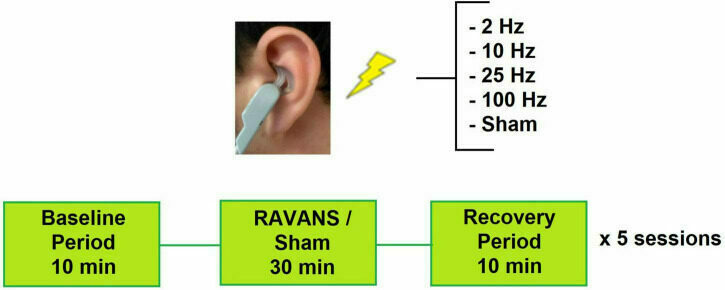Effects of TAVNS on cognitive and autonomic correlates of perseverative cognition.
This study out of Belgium compares verum versus sham TAVNS in patients with perseverative cognition. In these patients they can have psychophysiological stress with no provoking stressor. It is thought that cognitive inflexibility is related to autonomic inflexibility as measured by HRV. In this study, the verum group showed less cognitive perseveration after the TAVNS…
Read MoreTAVNS and HRV in Heart Failure Patients
Study using TAVNS (transcutaneous vagal nerve stimulation) in patients with heart failure showed improved autonomic balance and lifestyle measures with TAVNS after 20 sessions, 30 min eaThis study looked at a group of patients with heart failure. They were divided into two groups: sham TAVNS and 5hz/15hz. TAVNS. They all received 30 minute treatment, 5…
Read MoreAcupuncture for insomnia :Baihui (GV20), Neiguan (PC6), Shenmen (HT7) and Taichong (LR3) on cerebral cortical blood oxygen level in rats with insomnia
I like this study because it lays out a simple acupuncture point protocol for treating insomnia. It is recommended for subjects who exhibit a particular pattern, ie liver stagnation. It doesn’t use the often used point behind the ear A Mian. I will go ahead and test this prescription in the clinic for people with…
Read MoreThe Dosage Effect of Laser Acupuncture at PC6 (Neiguan) on Heart Rate Variability: A Pilot Study
This is a very important study in that it corroborates the groundbreaking study from Nature that established that the intensity/frequency of stimulation can be important in achieving parasympathetic increase. I measure parasympathetic activity, or vagal activity in the clinic. In this study they varied the energy density applied to Neiguan, or Pericardium 6. If it…
Read MoreTAVNS for Mild Cognitive Impairment Double Blind Study
A double blind randomized trial of transcutaneous auricular vagal nerve stimulation for mild cognitive impairment.Scroll down for a brief video explaining the importance of this study. This randomized controlled trial investigated the effects of transcutaneous auricular vagus nerve stimulation (taVNS) on patients with mild cognitive impairment (MCI). The primary outcome measure was the Montreal cognitive…
Read MoreTAVNS for Migraine:1Hz Better than 25hz
This study aimed to evaluate the efficacy and safety of TAVNS for migraine, or transcutaneous stimulation of the auricular branch of the vagal nerve (t-VNS) in treating chronic migraine. Patients were randomized to receive either 25 Hz or 1 Hz stimulation for 4 hours a day over three months. Patients in the 1 Hz group…
Read MoreAcupuncture for Migraine versus erenumab: 2020 study
Manual acupuncture for migraine This is from the British Medical Acupuncture Society Blog. It is from 2020 but very pertinent today! I love the tone of this blog. Lighthearted but fervent! A large portion of my practice is devoted to acupuncture for migraine. The basic points that he makes are 1. That he was amazed that…
Read MoreEfficacy and Mechanisms of Acupuncture for Migraine
Migraine is a condition I treat frequently in the clinic. This review article goes into the different mechanisms that account for acupuncture’s often dramatic results. The studies suggest that it can affects neuropeptides, immune cells, proinflammatory and excitatory neurotransmitters, and modulate neuronal-sensitization-related mediators, endocannabinoid system, and serotonin system activation. Clinical studies show that acupuncture can…
Read MoreAcupuncture versus Ajovy_fremanezumab
There was no difference between the acupuncture and fremanezumab in the reduction of monthly migraine rates. Think about that! This is an injectable, expensive drug that you would need to take for a long time. I would venture to guess from my own experience with migraine patients, that with acupuncture you need less and less…
Read MoreEar stimulation to Lower Blood Pressure: RAVANS or TAVNS
I’ve been looking at vagal activity with ear stimulation, or transcutaneous auricular vagal nerve stimulation (TAVNS)in the clinic for several years. As readers know, acupuncture calms the stress response by increasing vagal activity. TAVNS should increase vagal activity also. If I can show this, it would give me added confidence in having people use a…
Read More


